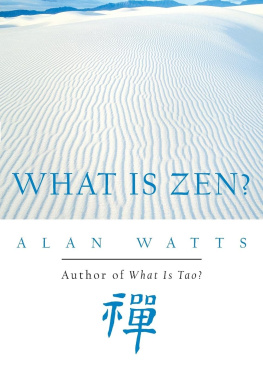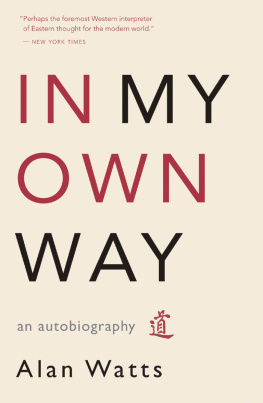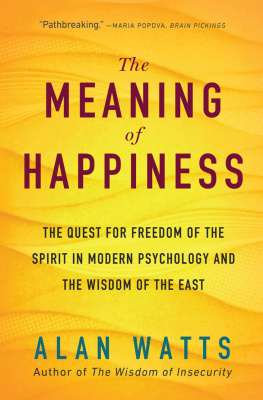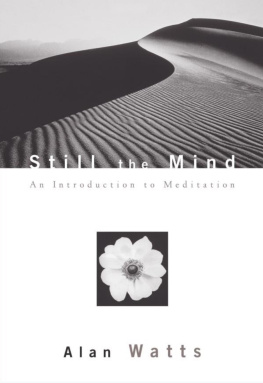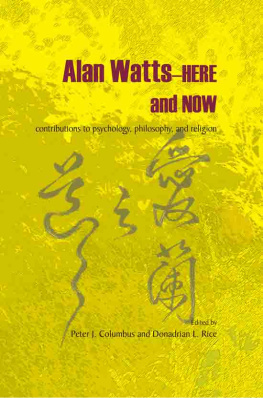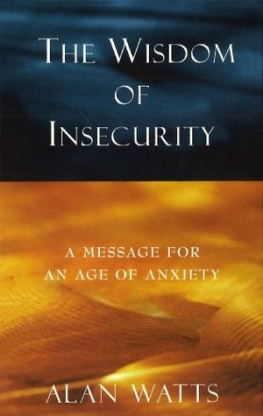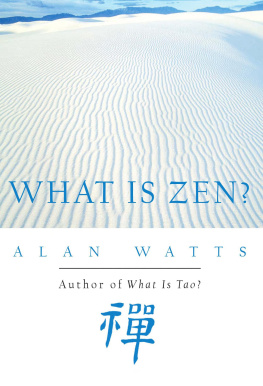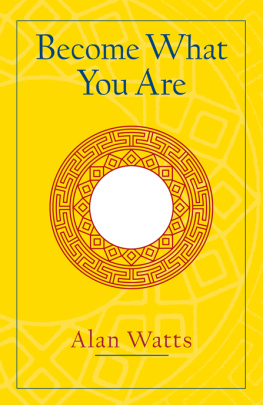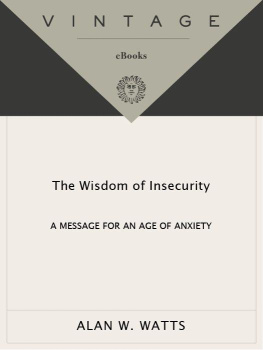All rights reserved. This book may not be reproduced in whole or in part, or
transmitted in any form, without written permission from the publisher,
except by a reviewer, who may quote brief passages in a review; nor may
any part of this book be reproduced, stored in a retrieval system, or trans
mitted in any form or by any means electronic, mechanical, photocopying,
recording, or other, without written permission of the publisher.
Watts, Alan, 19151973.
What is zen? / Alan Watts.
p. cm.
1. Zen BuddhismEssence, genius, nature. I. Title.
Zen is a method of rediscovering the experience of being alive. It originated in India and China, and has come to the West by way of Japan, and although it is a form of Mahayana Buddhism, it is not a religion in the usual sense of the word. The aim of Zen is to bring about a transformation of consciousness, and to awaken us from the dream world of our endless thoughts so that we experience life as it is in the present moment.
Zen cannot really be taught, but it can be transmitted through sessions of contemplation or meditation, called zazen, and through dialogues between student and teacher, called sanzen. In the dialogues between the student and Zen master the student comes squarely up against the obstacles to his or her understanding and, without making the answer obvious, the master points a finger toward the way.
Zen has enjoyed an increasing popularity in Western literature. D.T. Suzukis book Outlines of Mahayana Buddhism was first published in the English language in 1907, and authors R. H. Blythe, Christmas Humphries, and Alan Watts all made early contributions to Zen literature in the West. Alan Watts wrote his first booklet on Zen in 1933, followed by his first book, The Spirit of Zen, in 1936 at the age of twenty-one. He moved from London to New York in 1938, and after spending nearly ten years in the Anglican Church headed west to California in 1950, where he began to teach Eastern thought at the American Academy of Asian Studies in San Francisco.
There he met Japanese artist Sabro Hasegawa and beat poets Gary Snyder and Allen Ginsburg. His classroom lectures spilled over into the local coffeehouses, and in 1953 he began weekly live radio talks on Pacifica station KPFA in Berkeley, California. Early radio series included The Great Books of Asia and Way Beyond the West, which were later rebroadcast on KPFK in Los Angeles. In 1955 he began work on The Way of Zen with the help of a Bollingen grant arranged by Joseph Campbell, and following publication in 1957 he went to New York on the first of many cross-country speaking tours that continued over the next fifteen years.
The selections for What Is Zen? were drawn from his later talks, given after he had studied and practiced Zen for many years. Most of the material is from recordings made during weekend seminars in which Watts reconsidered Zen with a small group aboard his waterfront home, the ferryboat SS Vallejo, in Sausalito, California.
Instead of focusing on the historical background of Zen, he presented the subject directly, in a way he felt would be most accessible to his primarily Western audience. The result is a unique and effective example of the sanzen dialogue in practice, and although the words were delivered to a group, the individuals psychological hurdles are addressed with uncanny sensitivity to the mind traps that typically confound students of Zen.
In a delightful play of words, Wattss experienced presentation gives us a healthy, heaping serving of the essential wisdom one discovers with the experience of Zen, and points a finger towards the way.
Although not long ago the word Zen was unknown to most Europeans and Americans, it has for many centuries been one of the most potent influences in molding the cultures of Japan and China. It would be as great a mistake to leave out the consideration of Zen in a history of Japan as to omit Christianity in a history of England.
Zen remained relatively unknown to the world, however, because until rather recently the exponents of Zen were hesitant to spread the doctrine abroad for fear its essence would be lost. This is because Zen is a practice based entirely upon a certain kind of personal experience, and no complete idea of its truths can be given in words. Finally in the early years of the twentieth century various Far Eastern writers among them the noted Dr. D.T. Suzuki made known the details of this remarkable way of life. It then became apparent to Westerners that Zen is responsible for many of the things that fascinate us about the Far East, including the martial arts of judo and aikido and the exquisite aesthetic flavor that characterizes Chinese and Japanese art.
Many hold Zen to be at one with the root of all religions, for it is a way of liberation that centers around the things that are basic to all mysticism: awakening to the unity or oneness of life, and the inward as opposed to outward existence of God. In this context the word God can be misleading because, as will be seen, the idea of a deity in the Western religious sense is foreign to Zen.
The aim of this book is to act as a guide to give the contemporary reader some idea of the basic principles of Zen. My intention is to point out the way by offering the rudiments of the path to those whose search for truth has been hindered by the dogmas, creeds, and misunderstood rituals that choke the road of modern religion.
In the Western world we have become accustomed to thinking of spiritual concerns as being distinct from everyday life. We think of the spiritual as being other worldly, and therefore those art forms that portray spiritual subjects do so with symbols of the divine that transcend everyday materiality.
But in the art of Chinese Zen Buddhism one finds a supreme concentration on the most common aspects of everyday life. Even when the great sages of Buddhism are depicted, they are rendered in a secular style, just like very ordinary people, and more often than not as wandering idiots and tramps. The significance of this extremely human portrayal is that it shows us that their attitude about the relationship of the soul to the body and of mind to matter is entirely different from ours in fact they do not really consider the spiritual life in those categories at all.
We feel that our soul is separate from the body, that spirit is separate from matter, and by extension that God is separate from the world. And as we have confronted and tried to reconcile ourselves to this material world we have come to identify ourselves as a kind of detached soul, and therefore we have come to feel that there is a problem with material existence. We believe that life is something that we must conquer, or something we must somehow get out of. But either way we feel distinct from it, and think of ourselves not as a part of the natural material world, but as separate from it, dominating it, and trying to master it.

